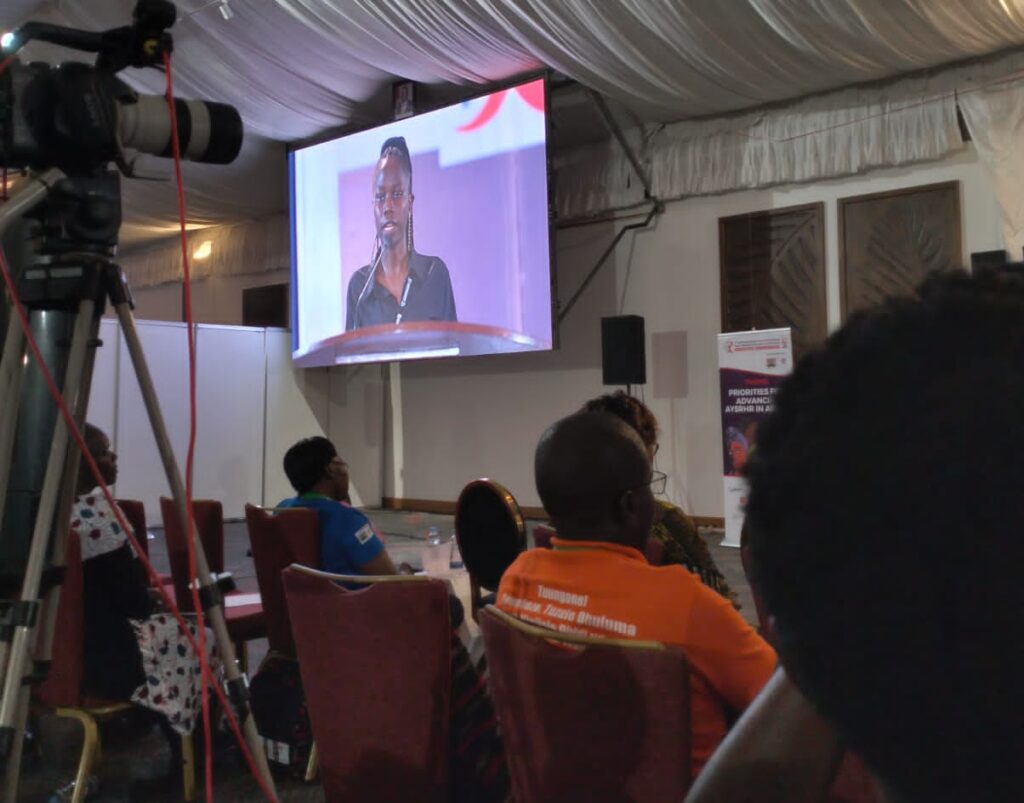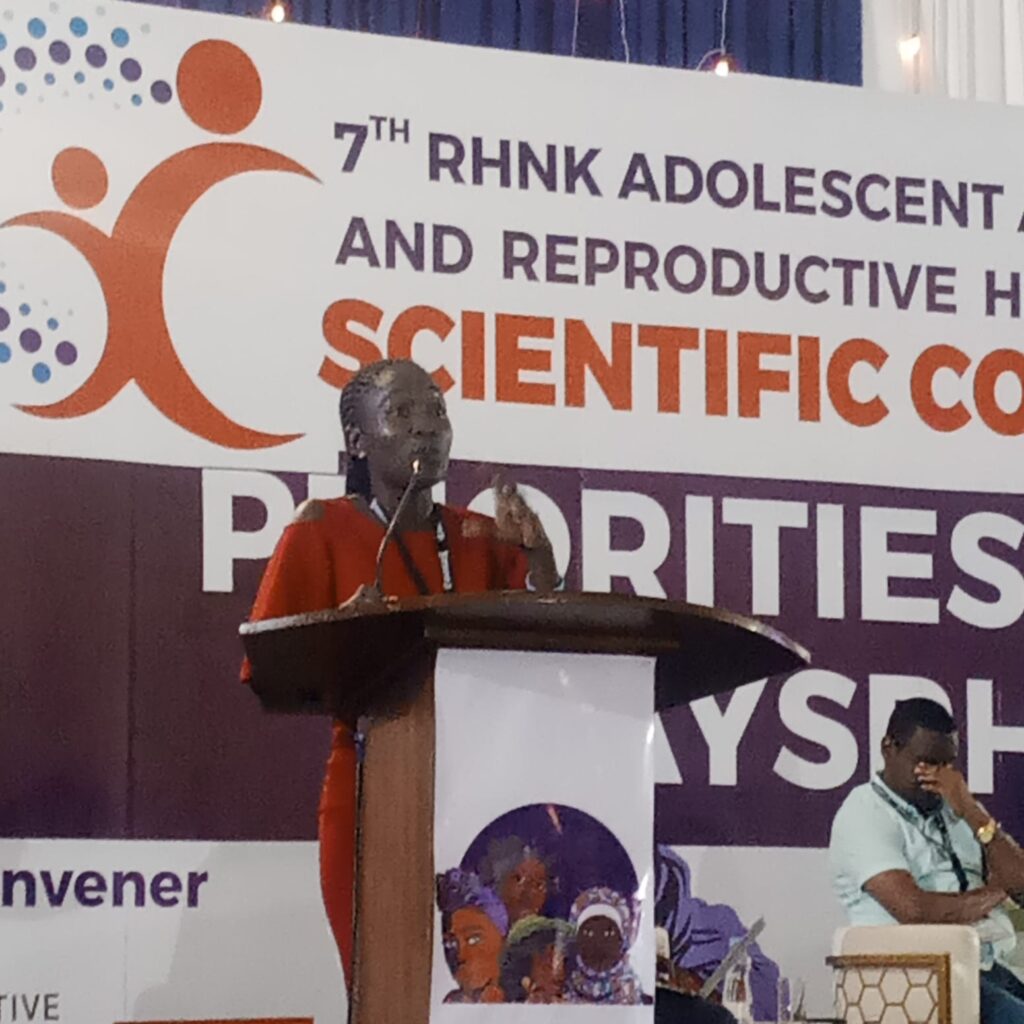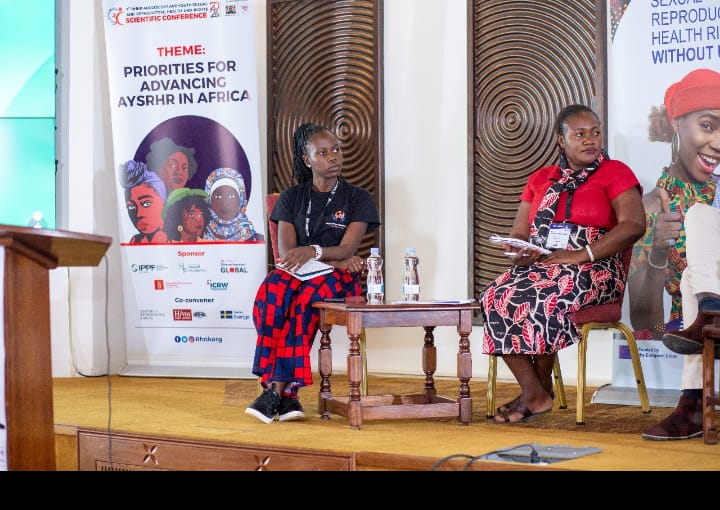Priorities for advancing AYSRHR in Africa
The 7th RHNK Scientific Conference was held from June 18th to 21st, 2024, at the Sarova Whitesands Beach Resort and Spa in Mombasa, Kenya. The conference theme was “Priorities for Advancing Adolescent and Youth Sexual Reproductive Health and Rights.”
The RHNK AYSRHR Scientific Conference kicked off with an empowering speech by Spotlight Speaker Halima Abba Ali Zaid, Program SRHR Royal Danish Embassy. She emphasized the importance of youth engagement in SRHR. She highlighted Denmark’s support for young people through initiatives like youth delegates at the UN and youth sounding boards at the embassy in Kenya. These programs empower young people with knowledge and advocate for their voices to be heard. She also reaffirmed Denmark’s commitment to collaborating with Kenyan partners on SRHR programs.

A powerful panel discussion on reproductive health self-care interventions, moderated by Dr. Albert Nwiga from the MOH-Kenya followed. The session highlighted the importance of self-care, not just for HIV prevention, but for all aspects of reproductive health. Panelists Elizabeth Jumwa, a healthcare provider, Vanessa Sekpon, a youth from Benin, Nelly Munyasia, representing CSOs, and Karen Aura, a policy maker, discussed various initiatives to empower young people to take charge of their health.
Reproductive Health Network Kenya (RHNK) emerged as a key player in promoting self-care. Nelly Munyasia, ED RHNK, emphasized RHNK’s collaboration with partners and the government to implement a self-care policy. This policy focuses on two key areas:
- Training healthcare providers: Equipping healthcare workers with the knowledge and skills to effectively guide young people on self-care options.
- Youth advocacy: Empowering young people through youth advocates to raise awareness about self-care options available to them.
Elizabeth Jumwa further emphasized that self-care goes beyond HIV prevention. She highlighted the availability of integrated clinics across the country that offer a comprehensive range of services, including STI screening, contraceptives, and counseling.
Breakout Sessions and Panel Discussions
A series of breakout sessions where delegates presented abstracts on the various conference sub-themes, including best practices in service delivery and community-based interventions for AYSRHR.
Ambale Saraphina from Eagle Wings Organization in Kisumu also presented her abstract in the main hall on Empowering Caregivers to Promote SRHR Information among Deaf Adolescents. Supported by Nairobits Trust under the Right Here Right Now program, this abstract focused on empowering caregivers and parents to promote SRHR information among deaf adolescents and young people. The key findings included:
- Deaf adolescents often rely on caregivers and parents as their primary source of SRHR information.
- Many parents lack comprehensive SRHR knowledge, hindering their ability to provide thorough and accurate information.
- Creating accessible SRHR resources tailored to the needs of deaf adolescents, including visual aids, sign language interpreters, and easy-to-understand content.
- Equipping parents with the knowledge and tools to effectively communicate SRHR topics helps bridge the information gap and ensures that deaf youth receive accurate and comprehensive information.
- Integrating SRHR education into regular discussions and curriculums for deaf adolescents promotes inclusivity and normalizes these essential conversations.
Main focus on Day 2 was on “Innovative digital solutions” that empower young people, discuss “Gender equity and social inclusion” to ensure no one is left behind, and delve into “Funding models” that create a sustainable future for AYSRHR services.
The team had a chance to join several breakout rooms from:
- Building together: adolescent and youth centric approaches to SRHR and Family Planning (hosted by PS Kenya) which explored youth-focused strategies for better health outcomes.
- Bridging the Gap in SRHR Services for Persons with Disabilities: Redefining Norms for AYSRHR Equality (hosted by GEM TRUST) tackled inclusivity challenges and reimagining AYSRHR for all.
- Empowering Women and Girls: Advancing Access, Affordability, and Sustainability of Self-Injectable Contraceptives via Informed Choice Programming (presented by ACCESS COLLABORATIVE).
Sheilla Mmbogah, one of our team members also presented an abstract on School-Based Dialogue Sessions and their transformative impact on changing the narrative around HIV-related stigma among adolescents and young people. 
Key Findings included:
- Using sports as a tool to gather and engage young people effectively. This innovative approach not only attracts participation but also fosters a supportive environment for open dialogue.
- Tailoring sessions to specific age groups helps identify and address the unique needs and concerns of each group, making the interventions more effective.
- Training teachers to engage adolescents meaningfully is crucial. Empowered educators can facilitate better discussions and provide the right support.
- Involving adolescents as partners in these sessions ensures that their voices are heard and valued, promoting a sense of ownership and engagement.
- Sharing information in a way that resonates with young people has a more significant impact. When they understand the message, they are more likely to internalize and act on it.
This abstract highlighted the importance of creating inclusive, engaging, and age-appropriate platforms for discussing HIV-related issues. By leveraging sports, empowering educators, and involving young people as active partners, we can effectively combat stigma and promote a more informed and supportive community.
Our team also had a chance of participating in a side event on Importance of Partnerships in Advancing Adolescent Reproductive Health in Africa. This event hosted by EANNASO focused on enhancing partnerships to improve adolescent sexual and reproductive health. Key speakers included: Lizzie Otaye, from EANNASO, Robert Athewa from NAPSHR, Saraphina Ambale, Founder Eagle Wings Org, Denis Bwana from EANNASO, Brenda Alwanyi, Executive Director MY BODY MY BODY, Noor Sheikh, Executive Director – HOTMA and Pastor Isabel Mwape, Faith in Action member from Zambia.
 The discussions highlighted the importance of collaborative efforts among governments, NGOs, healthcare providers, and community leaders in creating comprehensive and effective SRHR programs. Partnerships were shown to be essential in:
The discussions highlighted the importance of collaborative efforts among governments, NGOs, healthcare providers, and community leaders in creating comprehensive and effective SRHR programs. Partnerships were shown to be essential in:
- Sharing best practices and resources.
- Coordinating efforts to avoid duplication and enhance impact.
- Strengthening advocacy for policy changes and increased funding.
- Empowering communities by involving them in decision-making processes.
The conference had a Youth Café, providing a platform for vibrant, youth-led conversations on SRHR. This interactive session allowed us to voice our concerns, share experiences, and propose solutions for improving SRHR services. The key takeaways included:
- The need for youth-friendly services that are accessible and non-judgmental.
- The importance of peer education and support networks.
- Encouraging active youth participation in designing and implementing SRHR programs.
- The value of using technology and social media to reach and engage young people.
One of the critical lessons from the conference was the importance of thorough documentation at all stages of program implementation. Accurate records and data collection are vital for:
- Monitoring and evaluating the effectiveness of SRHR programs.
- Identifying gaps and areas for improvement.
- Sharing success stories and best practices with stakeholders and the wider community.
Partnerships emerged as a crucial element in advancing SRHR at all levels. Effective collaboration between various stakeholders ensures a more comprehensive approach to addressing SRHR issues, leading to better health outcomes and increased access to services.
Many thanks to Nairobits Trust and FP/RH Insight for the support to attend and present our abstracts.
